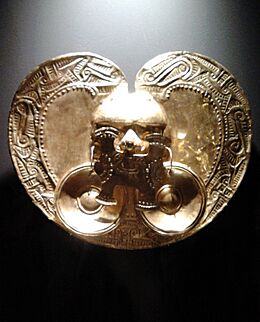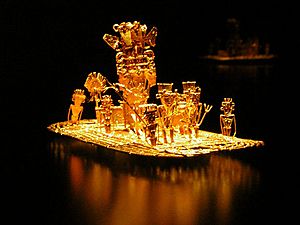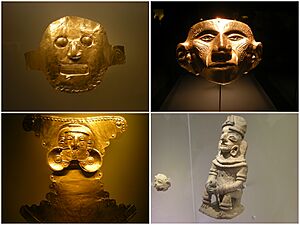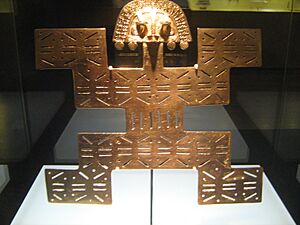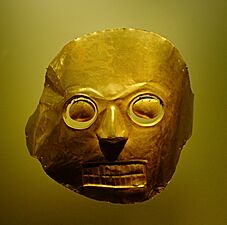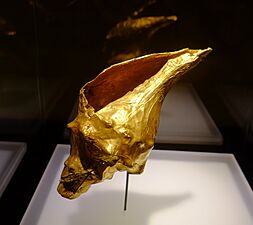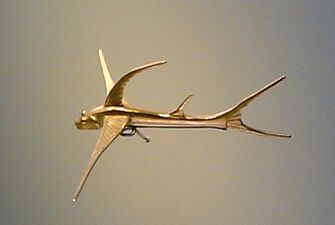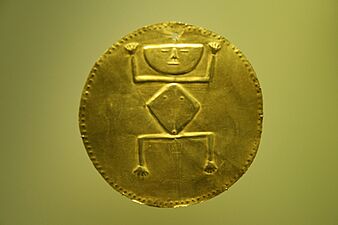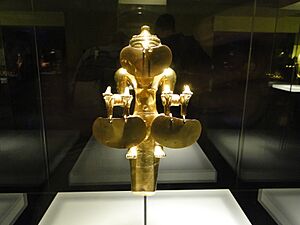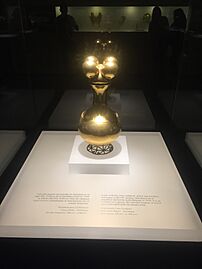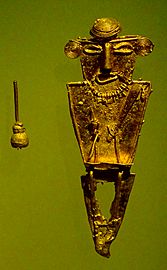Gold Museum, Bogotá facts for kids
 |
|
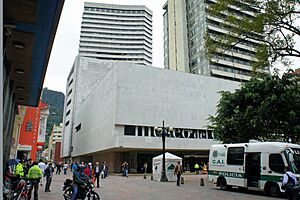
View of the Museum of Gold
|
|
| Established | 22 December 1939 |
|---|---|
| Location | Carrera 6 # 15-82 (Parque Santander) Bogotá, |
| Public transit access | |
The Museum of Gold (called Museo del Oro in Spanish) is a famous archaeology museum in Bogotá, Colombia. It is one of the most popular places for tourists to visit in the country. About 500,000 people visit the museum every year.
This museum shows off a huge collection of ancient gold items. It also has objects made from other metals, like Tumbaga, which is a mix of gold and copper. The museum has the largest collection of gold artifacts in the world. You can see these amazing pieces in the exhibition rooms on the second and third floors.
Along with gold, the museum displays items made from pottery, stone, shells, wood, and textiles. These objects were created by different indigenous groups who lived in what is now Colombia before the Spanish arrived. For these cultures, gold was not just about money. They believed it was a special, sacred metal with deep symbolic and religious meanings. For example, the Inca people thought gold was the "sweat of the sun" and silver was the "tears of the moon."
Discovering the Museum's History
How the Museum Started
In 1934, the Bank of the Republic started to help protect Colombia's important ancient treasures. The very first item in their collection was a piece called the Poporo Quimbaya. This special object has been on display for over 80 years! Today, the museum is managed by a group called Banrepcultural.
The Famous Muisca Raft
The museum is home to the famous Muisca golden raft. This incredible piece was found in Pasca in 1969. It shows a ceremony where a new ruler, called a zipa, took power. This ceremony is part of the legend of El Dorado. In the raft, the new ruler stands in the middle, surrounded by important leaders. Everyone is decorated with gold and feathers. They are making a big offering to their gods.
Museum's Big Renovation
The museum was closed for a long time for a big update. After ten years of work, it reopened in October 2008. With this renovation, the museum organized its permanent exhibits into five rooms. It also added an interactive room where visitors can learn more. Plus, they built an auditorium, new rooms for temporary exhibits, a cafe, a restaurant, and a souvenir shop.
Other Museum Locations
Did you know there are other Gold Museums in Colombia? You can find them in places like Calima, Quimbaya, Santa Marta, and Cartagena.
Exploring the Museum's Collections
What You Can See
The Museum of Gold has a huge collection of 55,000 pieces! About 6,000 of these are on display in the main building. Most of the exhibits have descriptions in both Spanish and English, so it's easy to understand. When you enter, you'll find the main entrance, a shop, and a restaurant on the first floor.
Main Exhibitions on the Second Floor
The main exhibitions start on the second floor. The biggest room is called "People and Gold in pre-Hispanic Colombia". Here, you'll see amazing gold items made by different cultures that lived in Colombia before the Spanish arrived. The permanent exhibition has special halls for each culture, including:
- Calima
- Quimbaya
- Muisca
- Zenú
- Tierradentro
- San Agustín
- Tolima
- Tairona
- Urabá
There's also a special room called "After Columbus" (Después de Colón).
Journey to the Third Floor
The exhibition continues on the third floor with two sections: "The Flying Chamanic" and "The Offering."
- "The Flying Chamanic" shows how a shamanic ceremony works, with different gold pieces used in it.
- "The Offering" is divided into three parts: the "Offering Room," the "Offering Boat," and the "Lake."
At the very end of the main exhibition, there's a "Profunditation Room." Here, you can watch artistic videos about the most important gold pieces in the museum.
Interactive Learning on the Fourth Floor
On the fourth floor, the museum has an "Exploratorium." This space is designed to help you interact, participate, and think about the amazing history and meaning of the treasures kept in the museum.
Research and International Exhibits
The Museum of Gold also welcomes researchers who want to study its collections. They offer a special service to help researchers access the artifacts.
The museum has also shared its treasures with other museums around the world. For example, in 2022, the Museo del Oro loaned many items to the Los Angeles County Museum of Art (LACMA). These pieces were part of an exhibition called "The Portable Universe / El Universo en Tus Manos: Thought and Splendor of Indigenous Colombia." This exhibit featured about 400 works, including detailed ceramics, ceremonial tools, textiles, and metalworks.
Gallery
-
The Muisca raft is the main piece in the Offering Boat Room
-
Muisca golden sea snail
-
A Tunjo figure
See also
 In Spanish: Museo del Oro para niños
In Spanish: Museo del Oro para niños
- Calima culture
- Calima Gold Museum
- Colombian mythology
- Indigenous peoples in Colombia
- Muisca
- Muisca art
- Quimbaya civilization
- Quimbaya Museum
 | Stephanie Wilson |
 | Charles Bolden |
 | Ronald McNair |
 | Frederick D. Gregory |


